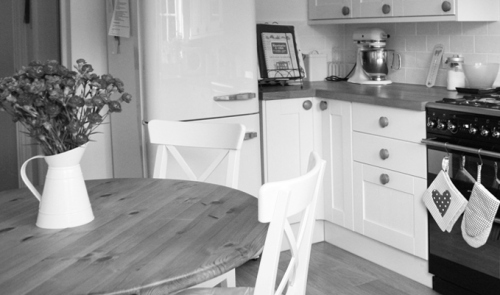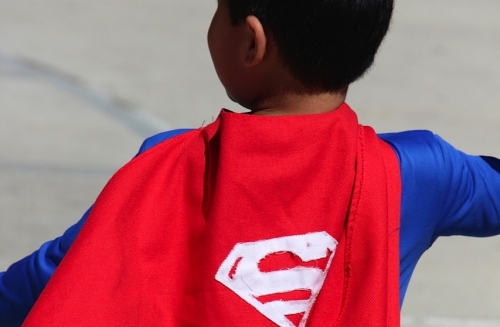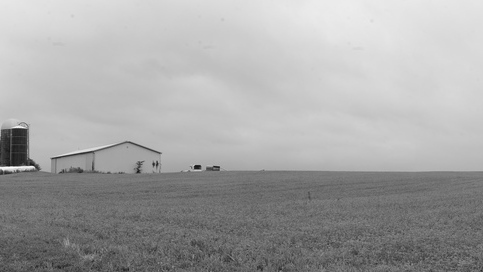Nervous Wreckage

Josh had a good job, a sweet face, and a sex drive. His lymphoma had been in remission for years. Before our first date, he warned me that he did not eat cheese, mayonnaise, eggs, “brunch food” of any sort, yogurt, buttermilk, poppy-seed bagels, bagels that had touched poppy-seed bagels, or seeded rye bread.
Memoir by Melissa F. Pheterson, Spring/Summer 2014
*
I didn’t scream even in labor, and I certainly won’t scream now. High decibels could assault my children’s ears, and their psyches. I swallow my panic, packing an icicle from throat to gut that cuts straight through my heart. Someday it will get to my head. For now, I laugh nervously and try to break the ice, to crack the waves that have frozen, startled, coursing up my stomach.
I was shredding the chicken boiled in the soup that my mother made the kids, trying to disguise the fact of its being boiled so that it didn’t resemble, as my husband scoffed, “under-salted peasant food.” Josh was in remission from cancer, and as his wife I needed to keep the lymphoma at bay. I had tried to make my own golden chicken soup with canned broth, to get it on the table before my mother possibly could, but I’d awkwardly plastered the open Campbell’s can with Saran wrap when I cut my thumb.
“You can’t keep soup in a can once it’s open,” said my mother, elbowing me aside. The fur coat that kept her warm brushed my hand, and in a flash of cognition I mouthed the “B” word.
Botulism. Of course.
I sighed with trembling throat, awash in relief for her vigilance as I clawed a damp paper towel to its fibers.
When the timer rang for the soup, I fished out thighs and legs, saving the virtuous white meat for my father and the gristly wings for me. Softly, I asked my husband whether I could serve him a piece with barbecue sauce.
“Peasants never grilled,” I ventured.
“All sugar and ketchup,” he scoffed. “I’ll grab take-out.”
“Don’t feel bad,” my mother said to me, relieved that he’d gone. “He was raised on take-out. You’ll never change the way he was raised.”
The children raced around the house, dodging the kitchen as my mother’s admonitions sprayed the room like little geysers of raw onion juice. She could have sworn she saw Josh sneaking cookies to the kids in the late afternoon, once the window for snacking had dropped like a guillotine. Did I want the children to develop his habits? If not, I had better speak up. Or else they were doomed. It wasn’t her place to interfere. “But you,” she said, “you’re the mother.” I hovered in a corner to stay dry, heart splitting like a cracked egg, as she placed the chicken in a ramekin in the microwave, because she thought it had cooled too long.
I took it out, felt it with my scaly just-scrubbed knuckles, and blew on it.
She frowned, nervous little jerks pulsing through her neck.
What had I done wrong? Was I blowing germs through the lips that sometimes still kissed my husband?
“I didn’t want it to be too hot,” I said.
“I didn’t want it to be too cold,” she said. “By the way, you need more eggs and your cheese is about to expire.” Or maybe it was: “By the way, the children’s socks look tight.” Or: “Your smoke alarm needs a new battery.” Or: “The kids’ sunscreen has too high an SPF.” I had turned on the water in the sink full-blast to drown her out.
To my triumph and heartbreak, the kids only licked the chicken; they couldn’t be bothered to bite it.
“Have some fruit,” I urged. I was at least competent enough to cut grapes in eighths, besting my mother’s quarters.
“Well,” said my mother softly, “they had a lot of fruit for lunch.”
She said it as though she felt their pain at having OD’d on citrus—pain that I had failed to apprehend.
Josh returned with chicken fried rice in Styrofoam containers, doling out some to his offspring. My mother gripped the counter till whiteness pooled into her just-scrubbed knuckles.
“Maybe, um,” I said, avoiding his gaze, “fried Asian food is hard on their stomachs?”
“Oh. Ok.” I could sense his mental artillery loading. “Can you name any strains of stomach cancer among kids in Asia?”
“Don’t laugh! It’s not funny!” Mom mouthed. “You’re the mother!”
I could have diffused the tension by asking the kids whether they indeed liked the food, but I was too nervous to prompt them to talk while they had food in their mouths, for the same reason I never joked around while they were drinking nor allowed them to point to their eyes during parts-of-the-body songs. Bad enough that some of the fairy tales we read before bed had depictions of juicy apples and candy castles, eliciting cravings and ruining sleep with reflux, heartburn, cramp.
My anxiety persisted. The goose pimples on my gut festered into lesions. I searched inside myself to find the reason, the piece of mother’s intuition that would explain everything.
“The peanuts!” I cried. “They’re a choking hazard in kids under three!” My daughter is two.
My mother looked pleased; even my husband relented, as though he were proud that he had driven me to an objection grounded in fact, not neuroses. It was his contribution to my rational living, which my parents did not comprehend. They lived, and ruled, by love and fear. A nervous mother is a good mother.
Once the storm had passed, I slipped out to a yoga class. My mother and husband exchanged a look of disdain for my holistic wackiness, and I was thrilled to have restored peace. I had taken one for my team, my tribe. But then, backing out of the garage in my mother’s car, the Bluetooth picked up the cell-phone call between Mom and Grandma.
“So exhausted…I feel like a scullery maid…and she’s off to yoga.”
“And leaving you to watch the children,” Grandma grunted.
“I thought nothing brought you greater joy than watching my children!” I yelled at the static fizz. I only yelled because no one could hear me.
*
In our bedroom hangs a caricature of us in Cape Cod, one year into our marriage and one year before we became parents. Our profiles, scrawled in thick black marker, gaze upon lighthouses and sailboats and seagulls, as our fingers interlace upon the shell of a bright red lobster grinning upon our gingham tablecloth. Only in this picture has food ever brought us together.
During that week of “mandatory fun” with my in-laws, I did not touch the lobsters that Josh and his family sucked down at Moby Dick’s seafood shack, green gooey liver and all. (“It’s a delicacy,” Josh claimed.) Glancing at the carcass made me sick. In the melee of cracking and sucking, I silently chewed at my tepid cod in broth.
Most mornings, my in-laws drove ten minutes to Starbucks to wait on a half-hour line, then came home and picked at fudge. Although I was nearly thirty, I was shocked that not everyone’s “breakfast” entailed sitting down with cereal and the morning paper.
In turn, the groceries I bought made Josh and his parents gag: Greek yogurt, cottage cheese, sardines. With priggish discipline, I willed myself to order fat-free soft-serve and boiled water for Oolong tea to take on the beach while everyone else passed a bag of Lay’s.
On a dank Fourth of July, waiting to board a whale-watching boat, I stood in a circle to ingest the Dramamine that Josh’s father was doling out with cultish solemnity. Rain aborted the adventure, and I spent the day trying to snap out of my stupor: taking brisk walks on the shore, getting tripped up by slimy black seaweed, chewing Wonder Bread on the couch of the bungalow as everyone else ran outside to watch fireworks. Finally I called my father, a doctor, because hearing his voice would make everything alright. He was furious that I’d taken Dramamine.
“Next time, call me,” he warned.
My parents’ wrath and anxiety had surged with every vacation photo posted to Facebook. Lobster liver was toxic, disgusting; they prayed no one had forced me to try it. My eyes looked glazed in certain pictures; was that from, God forbid, the Dramamine?
“They abuse drugs,” declared my father, meaning not only motion-sickness tablets but also espresso shots. “Ingest toxins. Overload their bowels. What kind of nurturing is that? Do they realize the link between nutrition and cancer?”
These questions loomed larger, darkening like storm clouds, when our son was born exactly one year later. For six mellow months, I breast-fed. Then my mother took over the feeding matters to the point that she called herself “Cooking and Caregiving Grandma.” My children still refer to her as “Cook.” She pureed soup, scrubbed pots, knocked over displays at the supermarket in her race to find the ripest produce. My little boy once wandered into a friend’s kitchen during a birthday party, calling out her name.
My children were the answer to my parents’ prayers. For years, I had gritted my teeth as my father cupped his hand around my elbow and told everyone assembled at synagogue how I enjoyed my little job in publishing, but what I really wanted was to be a wife and mother. I would have objected if it hadn’t been so utterly, pathetically true. I got dates, alright: an adult convert who’d finally had his Bar Mitzvah, the coming-of-age ritual for teens, and who’d lasciviously informed me that he was now “a man”; a forty-year-old law student whose two nieces I amused, frantically, by sprinkling pepper and garlic in my cup of water to slurp down at boring temple dinners; and a doctor who didn’t want to do more than kiss on the cheek (prompting even my father to scratch his head and say: “What’s wrong with him?”). I breathed a secret sigh of relief at their egregious flaws, for they helped keep my parents’ illusions intact: that I was pure and kind and a bit hapless, undergoing the requisite trials before salvation arrived—sort of like Job.
Josh had a good job, a sweet face, and a sex drive. His lymphoma had been in remission for years. Before our first date, he warned me that he did not eat cheese, mayonnaise, eggs, “brunch food” of any sort, yogurt, buttermilk, poppy-seed bagels, bagels that had touched poppy-seed bagels, or seeded rye bread.
“Don’t worry,” my mother assured me. “We’ll show him the light.”
*
Perhaps I could keep my irritation in check if I managed to sleep more, but Josh’s passion for debate surfaces in his dreams. The hot blue light of his smart phone casts a harsh glow on the wall, punctuated by his hulking shadow; the light sears my pupils and yanks my eyelids into retreat.
He insists it’s time to wake up and feed the children and leave for work, even though I’m a stay-at-home mother now. He often contests the outcome of a particular game that he must have just dreamt up. He accuses me of having won unfairly. I drew too many cards or not enough. “And you can’t put a Spanish pirate into play.” His parched throat sucks his yell into a rasp.
Furious, I burrow my head in the pillow as he yanks the covers to the ground. But my shrieks would wake the children. Instead, I take his hand and stroke it, force my voice to sound soothing even though I want to drive a pick-axe into his head: “It’s all right. It’s not yet morning. The children are asleep. It’s only a dream.” The first few times I assure him, he bristles, insisting I have cheated and wronged him. It takes five or six times before his eyes open wider, pooling with confusion; his head begins to cock at different angles in quick succession, like a robot sputtering to life; and he drops the hand that’s been thrusts the phone into my face. With a strange demented giggle, he disappears into the hall.
The first time he woke me like this, mere weeks before our wedding, I had clutched his hand and reminded him that it was early Saturday, that we had no plans for the weekend—I said this last bit with a slow release of panicked despair. I ignored him that morning as I poured his coffee, frosting the kitchen with my injured silence, waiting for him to grovel at my feet and apologize for violating me in bed (so to speak), until I realized he seemed to have no recollection of the incident. When he asked me to stop the passive-aggressive bullshit and tell him what he’d done wrong, I quoted his dialogue perfectly. The problem was, I couldn’t stop laughing. In the light of day, it seemed like a sitcom scene of cheap laughter, something that would play well on YouTube or Facebook.
“You can’t put a Spanish pirate into play?” he guffawed, hanging his head in affected chagrin. “Oh, man. I’m sorry. That’s some funny shit, though.”
“It’s okay. It’s just—I’m exhausted.”
He suggested I take a nap on the couch.
“Good idea.” Terrible idea.
“Maybe I’d sleep better with more downtime during the day,” he said, finally. “I don’t want to get sick again.”
My mother snorted when she heard this. “He doesn’t help you any as it is.” More accurately, his help fell short of my mother’s standards. He folded laundry hastily on the floor and forgot to put milk on the bottom shelf of the fridge, where it was coldest.
How could I hold him accountable for this temporary insanity? Of all potential deal-breakers, this was a risible one. After all, there were sleep clinics in town. And in waking life, his irksome rhetoric made mockery of my efforts: Carrots are like Fascists—they spoil any dish with their overwhelming badness; or The gym is torture to me, so I’m not going to work out with you, unless you WANT to subject me to cruel and unusual punishment, and if you DO want that for me, you don’t really love me...
At first I tried to take his objections to heart, to avoid committing the same mistake twice. I had not yet learned his algebra: to imply that I wanted X so that he’d rally behind Y, which I secretly wanted all along. I could not physically bring myself to retort that he was ridiculous, juvenile, or just plain mean. Screaming matches seemed counter-productive. I ran the treadmill in solitude and prepared colorful meals for one, stewing in self-righteousness.
*
Weeks before I got pregnant, there appeared in the washing machine of our apartment a viscous black liquid that I half-jokingly called “witch’s brew.” My mother, nervous for my reproductive health, begged me not to dip one finger in it. One summer morning, after a family party on Long Island, my grandparents guarded the side door of a Red Roof Inn while my mother and I hauled in duffel bags to wash in the housekeeping facilities. Josh, mortified at our trespassing, drove away cursing and scarlet-cheeked. He was as deferential to others as he was contrarian at home. But as my aunt shook out towels and my grandmother folded pillowcases, I felt so very safe and loved.
We returned to our shabby apartment with fresh clothes. With our lease ending, my parents begged us (and fronted us money) to move into an art deco building with a marble lobby, granite countertops, and a Nokia washer-dryer the size of a microwave that took about a day to clean one shirt.
“Now you’re ready to be a mom!” cried my father as the first load basted in bubbles, and within three months I was, thank goodness, pregnant.
In my eighth month, I watched my mother drape a fresh bed sheet over a layer of paper towels blotting the Windex on the clean glass table—all to fold a clean pair of pajamas.
“Don’t mind me,” she said with a nervous chuckle, “I’m a little crazy.” I tried to gauge her tone, understand this attention she had never lavished on my sweatshirts and jeans. Was she lamenting? Bragging? Crying for help?
When Josh took in the scene, he hissed: “Do I need to eat crouched on the floor of my room until the baby goes to college?”
This was the moment I first began to play dirty. To my husband I whispered that my mother was insane. To my mother I gave my most sincere thanks.
*
My body has tensed, permanently, to absorb and re-direct the arrows flying around and tearing through me. My father has been ill with gastroenteritis. My mother has a nervous twitch and bruised bags under her eyes. She unravels her knots of anxiety by blurting out her worries, dark thoughts bleached of danger in the fizz of reassurance. She has exquisite empathy and a steel-trap memory, neither forgiving nor forgetting any threat to her grandchildren, and I draw such comfort and resentment from her that my eyes sting. In the evenings before they leave my house, I catch my parents regarding the children and me with pained expressions, especially when they haven’t eaten. Perhaps they fear my husband will entice me, or more likely debate me, into yielding my higher ground.
At birthday parties, I am the nervous mother. I survey the festivities with my mother’s eyes. The bounce house should not, for God’s sake, follow the cake. The milk, fetched as an alternative for juice, should not languish on the top shelf of the fridge. Around my mother, I shrink and curl around the bolt of her presence. On my own, I seep into the space she’s left. I carried the carton to my kids like a torch, my arm wobbling only when Josh muttered that too much dairy was likely causing the kids’ constipation.
“He’s just saying that,” my mother sniffed, “because he doesn’t like cheese.”
Last summer, Josh and I took the kids to his law firm’s picnic in the park. I was easily the most nervous mother there, herding my kids past peril, and I shed so much anxiety that I finally slept in peace. The next morning, I saw my husband standing naked before the mirror in our bathroom, studying a red welt on his back.
“It’s back,” he sobbed, eyes wet. “The lymphoma.”
*
With my mother washing and re-washing the layette, my husband agreed to visit a sleep clinic so researchers could monitor his brain and body via wires. Under surveillance, lacking a ripening target, his slumber was undisturbed.
“Flying colors,” he said, and I offered up my white flag.
Our son filled and depleted me in equal measure. After weeks of nursing him every two hours, and standing over his crib in awed vigilance, the need for sleep pinned me to the bed, urgent and rapacious. That night, Josh shook me awake, thrusting a pillow on my chest, claiming it was hungry and needed to nurse.
“You mean, not that it’s a baby,” I slurred, batting his arm away.
“He’s hungry, it’s not my fault!”
In the morning, I blurted out: “What if you had mistaken the pillow for the baby, instead of the other way around? Or what if you dreamt the baby was a sack of trash for the compactor?”
His eyes went wild. “Why would you say that? Why would you plant that idea in my head?”
“He wouldn’t hurt the baby,” my mother said. “He’s the father.” She wanted to believe it. The baby spit up on his effigy-pillow, and my mother jumped up to wash it.
Josh had happily commenced a six-month paternity leave, which allowed him time to cook the spicy, fermented food he liked. My mother cooked casseroles and pasta, shoving aside his pans on the stovetop. She had read, or surmised—or perhaps I had surmised; I was too tired to keep track—that kimchi would make my milk taste funky.
“Spice isn’t good for the baby,” Mom told me.
“Stress isn’t good for the baby,” Josh told me.
And yet, I wanted to retort, the baby continues to grow.
Naturally, I’ve stopped urging Josh to join me in bed at a reasonable hour. We kiss each other good night, and I leave him to his own devices—pun intended.
I do not kiss my parents anymore. I cringe and chafe at the vigil they keep, but I dare not protest it—not when my children are growing so nicely. And when I bolt upright with horror in the middle of the night (Did the little vintage dress I got on Ebay have a sordid past? I only washed it once!) I need only run to my mother to make the bogeyman flee. “It’s fine, sweetheart. I’m sure older factories don’t have nearly the amount of mice and rats as they do now.”
Like my husband, Mom rewards me when I think like her.
Don’t mind us; we’re a little crazy.
*
In the week of waiting for his biopsy, Josh diagnosed himself with cancer. He took a leave of absence, citing the temptation to endlessly Google “mortality rates for lymphoma” at his desk. He woke me not to argue about dreamt-up games, but to bemoan his fate. When I begged for sleep, he said, “You heartless bitch! I could die!”
I told him to call a cancer support hotline. He threatened to divorce me. The next day I called the oncologist to beg for the results of his biopsy, to put me out of my misery. The oncology nurse called me an “advocate.”
How little she knew.
The results showed the welt was “benign, most likely an infected bug bite.”
Josh was a tad disappointed, his wellspring of rhetoric sucked dry. My parents were elated.
“You see!” said my father. “He never spends anytime outside with us and the kids! Of course he’d confuse a bite for a cancer.”
My life wasn’t tragic after all. It was ridiculous, sublime, ironic, coddled—so how could I complain?
This is why I can’t coax my voice out of the icicle. I can only create collusion between my mother, father and husband, diverting the arrows even as they’re slung. You want to do yoga? Go for therapy? But we’re in the middle of target practice!
My speaking up is really a mere soliloquy: sound and fury, symbolizing nothing and everything. But I hold onto one secret thought, the silver lining to my lack of agency: If misfortune strikes my children, it will not stain my conscience—because I will not have set the series of unfortunate events in action. Remembering this lets the arrows ping gently off my back. It makes a lozenge of the swallowed, stalled panic.
*
Melissa Pheterson is a journalist and writer of short stories and personal essays. Her work has appeared in Bacopa Literary Review, decomP and The Healing Muse. She lives in Rochester, NY.
Image: Source
 Saturday, June 14, 2014 at 04:46PM
Saturday, June 14, 2014 at 04:46PM 



